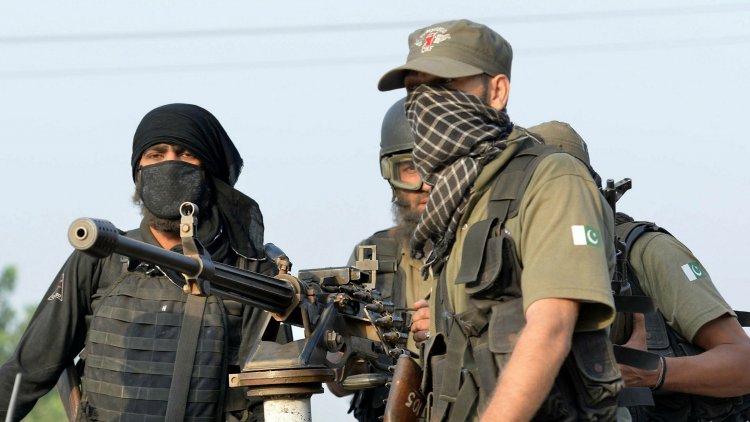Tehreek-E-Taliban Major Threat to China, Pakistan
STORIES, ANALYSES, EXPERT VIEWS

China and Pakistan’s immediate worries stem from the regrouping of Tehreek-e-Taliban Pakistan (TTP) in Afghanistan’s Paktika province. The TTP has declared Pakistan as its sole theatre of operation and claimed that it poses no threat to other nations. The TTP aims to establish a Sharia state in the old Hind (Hindustan) region beginning with Pakistan.
The Pakistan army had dealt a serious blow to the TTP in June 2014 through its operation Zarb-e-Azb (sharp and cutting strike) in the North Waziristan region which resulted in the killing of about 3,500 militants and the loss of its 490 soldiers, with the displacement of more than a million people and the destruction of their properties and businesses.
Broadening support of TTP: concerns for Pakistan
According to the 27th report of the UN Analytical and Monitoring Team published recently, five splinter groups — Shehryar Mehsud, Jamaatul Ahrar, Hizbul Ahrar, Amjad Farooqi and Usman Saifullah (formerly known as Lashkar-e-Jhangvi) — pledged allegiance to the TTP in July-August 2020.
Yogesh Gupta (Former Ambassador) writs “the TTP is trying to broaden its support base by including the disaffected Pashtun and Baluch ethnic groups, including the Pashtun Tahafuz Movement (PTM). With the consolidation of numerous splinter groups such as Lashkar-e-Jhangvi and al-Qaeda affiliates, it is likely that the TTP will intensify its activities in Pakistan’s urban centres where these groups have had strong networks in the past.”
According to a recent US government report, the TTP’s fighting strength in 2020 ranged from 2,500 to 6,000 members and it was responsible for more than 100 cross-border attacks in various parts of Pakistan between July and October 2020. The main targets of the TTP’s attacks in 2020 were the Pakistan army (73% cases, 110 attacks with 179 killings), the police and other security agencies…….
“While Pakistan pursues a political agenda in Afghanistan through its support of the Afghan Taliban, the TTP, al-Qaeda, IS and others are pursuing a politico-religious agenda of establishing a Sharia-based Islamic state which will not be to the liking of many Pakistanis. Any future military operation to oust the TTP from Pakistan’s border areas will be much more difficult because of the ease with which TTP militants are able to seek refuge in Afghanistan and their mingling with the large number of Afghan refugees in Pakistan.”
Concerns for China
The TTP’s reunification has increased China’s concerns too, according to Gupta “as the latter is executing several projects in hydropower generation and infrastructure development in Khyber Pakhtunkhwa (KP, earlier NWFP) province. The TTP has kidnapped and killed several Chinese nationals in Khyber Pakhtunkhwa and Baluchistan provinces……..”
The Uighur Muslims factor: The TTP has issued statements against China condemning the persecution faced by the Uighur Muslims in China. Several Uighur militants belonging to the ETIM (East Turkestan Islamic Movement) have relocated from Syria to Badakshan province of Afghanistan neighbouring Xinjiang, where China is carrying out a vast campaign to incarcerate them in prison camps for re-education. The Badakshan province connects with China through the narrow Wakhan corridor, a passage that the Uighur militants could use for entry into Xinjiang. The resurgence of Islamic extremism in Xinjiang, says Gupta “province could threaten several silk road networks connecting China with Russia, Central, Southern and Western Asia, Eurasia and Mongolia.”
Last week, Taliban spokesman Suhail Shaheen said in an interview that it would not allow Uighur militants to enter the country. Many, however, do not take the Taliban’s words seriously as it had made similar promises not to allow the activities of al-Qaeda on Afghan soil in the Doha peace deal — a promise which it observed only in its breach. Despite an understanding between the Taliban and China dating back to December 2000, when Mullah Omar was the Taliban chief, Gupta says “the Uighurs have repeatedly made use of the Afghan territory for various activities. Though China is offering a carrot of increased investments if its interests are protected by the Taliban, it will watch the emerging situation carefully before making any new commitments in Afghanistan.
“Given its emphasis on more orthodox Islam, the TTP is likely to provide support to ETIM and target projects of importance to China in Pakistan. China is already concerned about the growth of TTP, ETIM, al-Qaeda and Islamic State in Afghanistan and will be hard put to devise strategies to prevent the infiltration of these elements into its restive Xinjiang province.”
















